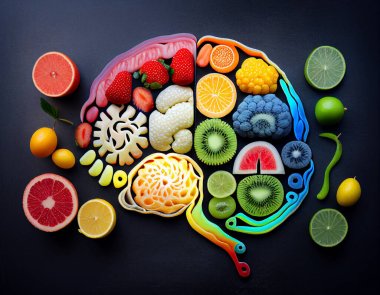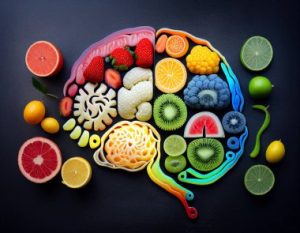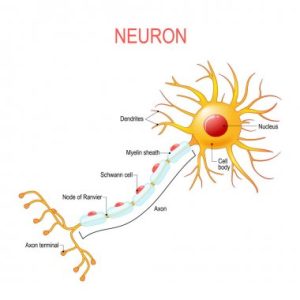
Source Of Nutrition For Vertebrate Neurons (5 Important Energy Sources)
Source of nutrition for vertebrate neurons, the intricate network of blood vessels ensures a constant supply of oxygen and glucose, essential for sustaining the energy-demanding processes of neural function. In the intricate tapestry of the brain, where thoughts dance and memories weave, the sustenance of vertebrate neurons becomes a captivating symphony of biological brilliance.
Like a well-orchestrated ballet, these tiny information processors rely on a myriad of molecular performers to fuel their cognitive feats. The source of nutrition for vertebrate neurons is a mesmerizing tale of biochemical choreography, where nutrients pirouette through the synaptic stage, ensuring that the brain’s intricate ballet never misses a beat.
In this symphony of survival, the elements of life conduct a harmonious dance, nurturing the neurons that compose the very essence of our cognitive existence. Join me on a journey through the neural enigma, where the source of nutrition is the secret ingredient to the ballet of thought that unfolds within the majestic theater of the mind.

Source Of Nutrition For Vertebrate Neurons
The primary source of nutrition for vertebrate neurons is glucose, a simple sugar obtained from the breakdown of carbohydrates. This essential energy source fuels the intricate processes required for proper nerve cell function.
Glucose as the Neurological Powerhouse
In the realm of vertebrate neurons, glucose stands as the paramount source of energy. This simple sugar, derived from ingested carbohydrates, is the linchpin for sustaining the high metabolic demands of nerve cells. Glucose undergoes glycolysis, a process that yields adenosine triphosphate (ATP), the currency of cellular energy. Neurons, being highly active cells, depend on a constant supply of ATP to facilitate vital functions such as signal transmission and maintenance of cellular integrity.
Blood-Brain Barrier: Safeguarding the Neuronal Feast
Ensuring a steady supply of glucose to vertebrate neurons involves overcoming the protective barrier known as the blood-brain barrier. This specialized structure regulates the passage of substances from the bloodstream into the brain, ensuring a controlled environment. Glucose transporters facilitate the entry of glucose molecules into neurons, ensuring that this vital energy source reaches its intended destination.
Astrocytes: Nutrient Custodians of the Nervous System
In the intricate tapestry of neurological nutrition, astrocytes emerge as crucial players. These star-shaped glial cells play a pivotal role in maintaining the well-being of neurons. Astrocytes actively participate in the uptake and storage of glucose, acting as nutrient custodians that ensure a reliable reservoir for neurons to draw from during times of heightened activity or glucose scarcity.
Alternative Fuel Sources: Adapting to Neuronal Demands
While glucose reigns supreme, neurons showcase remarkable adaptability by utilizing alternative fuel sources when necessary. Ketone bodies, derived from the breakdown of fats, serve as a secondary energy substrate during periods of glucose shortage. This adaptive strategy allows vertebrate neurons to maintain functionality even under challenging nutritional conditions, highlighting the intricate mechanisms that safeguard the brain’s continuous operation.
Structure of Neuron
Neuronal Cell Body (Soma)
Composition and Functions
The neuronal cell body, also known as the soma, serves as the command center of the neuron. Comprising the nucleus, endoplasmic reticulum, and other organelles, it orchestrates vital cellular activities. The nucleus contains genetic information crucial for the neuron’s function, while the endoplasmic reticulum synthesizes proteins essential for signal transmission.
Nutrient Requirements
The soma demands a diverse array of nutrients to maintain its metabolic functions. Essential elements such as glucose, amino acids, and vitamins fuel the energy-intensive processes within the cell body, sustaining the neuron’s overall health and functionality.
Dendrites
Structure and Function
Dendrites, resembling tree branches, extend from the cell body and play a pivotal role in receiving signals from other neurons. Their intricate structure, covered in synapses, facilitates the transmission of electrochemical messages, allowing for communication within the neural network.
Nutrient Exchange in Dendrites
Nutrient exchange in dendrites is crucial for their responsiveness. As information travels through synapses, essential nutrients like ions and neurotransmitters facilitate rapid signal transmission, ensuring efficient communication between neurons.
Axons
Structure and Function
Axons, elongated projections from the cell body, serve as conduits for transmitting signals to other neurons. Clad in a myelin sheath, they enhance signal speed. Terminal branches, or axon terminals, release neurotransmitters to transmit signals to the next neuron.
Nutrient Transport Along Axons
Efficient nutrient transport along axons is vital for their sustained functionality. Microtubules within axons facilitate the movement of nutrients, ensuring that the energy and building blocks required for signal transmission reach their destination promptly.

Energy Sources for Neurons
Glucose
Importance of Glucose for Neuronal Energy
Glucose stands as the primary fuel for neurons, serving as a vital energy source crucial for optimal brain function. The brain’s high metabolic activity demands a constant and efficient supply of glucose, making it a cornerstone in maintaining cognitive processes, memory, and overall neurological health. Its significance in neuronal energy production is unparalleled.
Glucose Metabolism in Neurons
Neurons adeptly utilize glucose through a series of intricate metabolic processes, such as glycolysis and the citric acid cycle. These pathways enable the breakdown of glucose into adenosine triphosphate (ATP), the cellular energy currency. This energy production is essential for neurotransmitter synthesis, signal transmission, and the myriad of complex functions neurons perform daily.
Ketone Bodies
Utilization of Ketones as an Alternative Energy Source
Ketone bodies, namely beta-hydroxybutyrate, acetoacetate, and acetone, emerge as alternative energy substrates for neurons, particularly during periods of low glucose availability. This metabolic flexibility allows neurons to efficiently switch to ketones, ensuring a continuous and stable energy supply even in the absence of ample glucose.
Conditions Leading to Increased Ketone Use
Increased ketone utilization by neurons occurs in conditions like fasting, ketogenic diets, or during states of increased energy demand. This adaptive response showcases the brain’s ability to thrive under varying metabolic circumstances, emphasizing the role of ketone bodies as a crucial adjunct to glucose in sustaining neuronal energy requirements.
Oxygen
Role of Oxygen in Neuronal Metabolism
Oxygen plays a pivotal role in neuronal metabolism, serving as the final electron acceptor in the electron transport chain during cellular respiration. This process, known as oxidative phosphorylation, is essential for generating the majority of ATP, the energy currency for neurons. Adequate oxygen supply is paramount for maintaining optimal brain function.
Cellular Respiration in Neurons
Neuronal cellular respiration involves the sequential processes of glycolysis, the citric acid cycle, and oxidative phosphorylation. Oxygen acts as a key player in the electron transport chain, facilitating the production of ATP. The tight integration of these processes underscores the dependence of neurons on oxygen for sustained energy production, ensuring the continuous support of intricate neural activities.
Neurotransmitters and Their Precursors
Introduction to Neurotransmitters
Neurotransmitters, the chemical messengers of the brain, play a pivotal role in regulating various physiological and psychological functions. These tiny molecules facilitate communication between nerve cells, enabling the transmission of signals across synapses. Understanding the origins of neurotransmitters unveils the intricate dance of biochemical processes within the brain, where amino acids serve as fundamental precursors for these essential signaling molecules.
Amino Acids as Precursors for Neurotransmitters
Glutamate: The Excitatory Dynamo
At the forefront of neurotransmitter activity is glutamate, an amino acid that acts as the brain’s principal excitatory neurotransmitter. Responsible for enhancing neural transmission, glutamate is a linchpin in cognitive processes such as learning and memory. Its intricate dance within the synapses forms the basis of rapid, dynamic brain communication.
GABA: The Inhibitory Maestro
Gamma-aminobutyric acid (GABA), derived from another amino acid, serves as the chief inhibitory neurotransmitter. With its calming influence on the nervous system, GABA plays a crucial role in maintaining balance and preventing overexcitation. The rhythmic interplay of GABA within the neuronal network forms the foundation for emotional stability and stress regulation.
Dopamine: The Reward Pathway Architect
Derived from the amino acid tyrosine, dopamine is renowned for its involvement in the brain’s reward system. Often referred to as the “feel-good” neurotransmitter, dopamine contributes to motivation, pleasure, and reinforcement learning. Its nuanced impact on mood and behavior underscores its significance in mental well-being.
Serotonin: The Mood Stabilizer
Tryptophan, an essential amino acid, serves as the precursor for serotonin, a neurotransmitter intricately linked to mood regulation. Commonly associated with feelings of well-being and happiness, serotonin’s influence extends to sleep, appetite, and overall emotional balance. Understanding the serotonin pathway offers insights into addressing mood disorders and enhancing mental health.
Vitamins and Minerals
Vitamin B Complex
Importance in Neuronal Function
Vitamin B Complex plays a pivotal role in maintaining optimal neuronal function. Essential components like B6, B9, and B12 are crucial for synthesizing neurotransmitters, aiding in nerve signal transmission, and supporting overall cognitive health. Individuals often associate B vitamins with enhanced memory, focus, and mood, underlining their significance in neurological well-being.
Sources and Functions of B Vitamins
Common sources of B vitamins include whole grains, leafy greens, and lean proteins. B1 (thiamine) aids energy metabolism, B2 (riboflavin) supports antioxidant defenses, and B3 (niacin) plays a role in DNA repair. B12, primarily found in animal products, is crucial for nerve cell maintenance. Recognizing the diverse dietary origins of these vitamins is key to ensuring a well-rounded intake for comprehensive neurological support.
Vitamin C
Antioxidant Role in Neurons
Vitamin C serves as a potent antioxidant, safeguarding neurons from oxidative stress. Commonly associated with citrus fruits, this vitamin combats free radicals, promoting neuronal resilience. Individuals seeking to enhance cognitive longevity often incorporate vitamin C-rich foods into their diets, emphasizing its protective role in neurological health.
Collagen Formation and Neuronal Support
Beyond its antioxidant properties, vitamin C plays a vital role in collagen synthesis. Collagen, a structural protein, provides crucial support for neuronal structures. Ensuring an ample intake of vitamin C, found in fruits like oranges and strawberries, not only contributes to cognitive well-being but also aids in maintaining the structural integrity of neural tissues.
Minerals (e.g., Calcium, Magnesium, Zinc)
Significance for Neuronal Signaling
Calcium, magnesium, and zinc are integral minerals in the intricate process of neuronal signaling. Calcium regulates neurotransmitter release, magnesium supports synaptic plasticity, and zinc modulates neuronal excitability. These minerals are keystones in the foundation of efficient communication between nerve cells, facilitating smooth cognitive functions.
Regulation of Ion Channels
The regulation of ion channels is a critical aspect of neural function, and minerals like calcium, magnesium, and zinc play pivotal roles in this process. Calcium ions, for example, facilitate the opening and closing of ion channels, influencing nerve impulses. Incorporating mineral-rich foods, such as dairy products for calcium and nuts for magnesium, becomes essential for maintaining the delicate balance of ion channels crucial for optimal neuronal function.

Blood-Brain Barrier
Structure and Function of the Blood-Brain Barrier
The blood-brain barrier (BBB) stands as an intricate fortress safeguarding the brain from external threats while orchestrating a delicate balance in nutrient exchange. This formidable barricade is primarily composed of tightly packed endothelial cells forming the walls of brain capillaries. These cells are fortified by specialized tight junctions, creating a barrier so impermeable that it restricts the entry of harmful substances. This intricate architecture acts as a guardian, regulating the passage of molecules between the bloodstream and the brain tissue.
Selective Permeability for Nutrient Transport
Within the orchestrated dance of the blood-brain barrier, a remarkable feat of selective permeability unfolds. This dynamic process allows essential nutrients, such as glucose and amino acids, to gracefully traverse the barrier and nourish the neurons. The term “selective permeability” encapsulates the BBB’s ability to discern between vital nutrients and potentially harmful substances, ensuring that only the necessary building blocks reach the brain. This selectivity is a critical facet in maintaining the neurological equilibrium required for optimal brain function.
Challenges and Implications for Neuronal Nutrition
Despite its protective prowess, the blood-brain barrier poses challenges in ensuring adequate neuronal nutrition. The meticulous control over substance passage, while crucial for maintaining a pristine cerebral environment, can hinder the delivery of therapeutic agents for neurological disorders. The term “neuronal nutrition” encompasses the intricate balance that must be struck to meet the metabolic demands of neurons. Navigating this delicate equilibrium becomes particularly crucial in the context of neurodegenerative diseases, where optimizing nutrient transport across the BBB holds profound implications for treatment efficacy and patient well-being.
Impact of Diet on Neuronal Health
Diet plays a crucial role in influencing neuronal health, exerting a profound impact on the structure and function of the brain. The brain is a highly energy-demanding organ, and the nutrients we consume directly influence its performance. A diet rich in omega-3 fatty acids, antioxidants, vitamins, and minerals has been linked to improved cognitive function, memory retention, and overall brain health.
Conversely, a diet high in saturated fats, refined sugars, and processed foods may contribute to inflammation and oxidative stress, negatively affecting neuronal function and increasing the risk of neurodegenerative diseases.
The gut-brain connection further underscores the importance of a balanced diet, as the microbiota in the digestive system can influence neurotransmitter production and impact mood and cognitive function. Adopting a nutrient-dense and well-balanced diet is not only essential for maintaining physical health but also plays a pivotal role in nurturing optimal neuronal function and promoting long-term cognitive well-being.
Neurodegenerative Diseases and Nutrition
Alzheimer’s Disease
Nutritional Strategies for Prevention
Alzheimer’s disease, a progressive neurodegenerative disorder, is influenced by various factors, including nutrition. Adopting a diet rich in antioxidants, such as fruits and vegetables, can mitigate oxidative stress, a contributing factor to Alzheimer’s. Omega-3 fatty acids, found in fatty fish, flaxseeds, and walnuts, may support brain health. Maintaining a balanced diet that includes vitamins C and E, along with folate, has shown promise in reducing the risk of cognitive decline.
Dietary Interventions in Management
Nutrition plays a crucial role in the management of Alzheimer’s disease. A Mediterranean diet, characterized by high consumption of fruits, vegetables, and whole grains, has demonstrated potential benefits in slowing cognitive decline. Additionally, managing blood sugar levels through a balanced diet may help regulate insulin, positively impacting brain function. Adequate hydration and the inclusion of foods with anti-inflammatory properties further contribute to holistic Alzheimer’s management.
Parkinson’s Disease
Impact of Nutrition on Disease Progression
Nutrition can significantly impact the progression of Parkinson’s disease. Consuming a diet rich in antioxidants, particularly from berries and leafy greens, may help reduce oxidative stress associated with Parkinson’s. Adequate protein intake, along with distribution throughout the day, can support muscle function and mitigate motor symptoms. Vitamin D, often obtained through sunlight exposure or supplements, has been linked to a potential slowdown in disease progression.
Potential Neuroprotective:
Certain foods provide neuroprotection against Parkinson’s disease. Blueberries, rich in anthocyanins, have been associated with improved cognitive function. Turmeric, containing curcumin, exhibits anti-inflammatory properties that may benefit individuals with Parkinson’s. Green tea, with its polyphenols, is another potential neuroprotective beverage. These foods, with their unique properties, offer a natural approach to supporting brain health in Parkinson’s patients.
Future Directions and Research
Advancements in Understanding Neuronal Nutrition
In the ever-evolving landscape of neuroscience, researchers are delving deeper into the intricate relationship between neuronal health and nutrition. Unraveling the mysteries of how specific nutrients impact cognitive function and overall brain well-being is at the forefront of scientific inquiry.
Cutting-edge studies are shedding light on the nuanced interplay between dietary elements, such as omega-3 fatty acids and antioxidants, and neuronal processes, garnering significant attention in the scientific community. As we navigate this uncharted territory, the pursuit of comprehensive insights into neuronal nutrition holds promise for enhancing mental resilience and mitigating cognitive decline.
Potential Therapeutic Approaches
In the realm of neurotherapeutics, a paradigm shift is underway, fueled by breakthroughs in our understanding of brain function. From innovative pharmaceutical interventions to holistic lifestyle modifications, the spectrum of potential therapeutic approaches is expanding rapidly.
The buzz around neuroplasticity, personalized medicine, and targeted interventions reflects the growing optimism in harnessing the body’s innate capacity for neural repair. As explore novel avenues such as neurostimulation and biofeedback, the future promises a more nuanced and effective approach to addressing neurological disorders. This dynamic landscape beckons a new era of treatment modalities that align with the intricacies of individual neurobiology.
Areas for Further Investigation
While strides have been made in neuronal nutrition and therapeutic strategies, the scientific community acknowledges the vast terrain that remains uncharted. Areas ripe for further investigation include the gut-brain axis, where the microbiome’s impact on neurological health is a burgeoning area of interest.
Additionally, understanding the role of epigenetics in shaping neural responses opens avenues for targeted interventions. The intricacies of neuroinflammation and its role in various disorders are also focal points, with researchers striving to decode the underlying mechanisms. As the field advances, the call for interdisciplinary collaboration and data-driven methodologies reverberates, ensuring that future research is both robust and applicable to the complex tapestry of neurological health.
FAQ: Source of Nutrition for Vertebrate Neurons
Q1: What is the primary source of nutrition for vertebrate neurons?
A1: Glucose is the main source of nutrition for vertebrate neurons. These cells rely heavily on glucose metabolism to produce energy through cellular respiration.
Q2: How do neurons obtain glucose for energy?
A2: Neurons obtain glucose through the bloodstream. The blood-brain barrier allows glucose to enter the brain, where neurons can take it up and utilize it for energy production.
Q3: Are there alternative sources of energy for neurons besides glucose?
A3: While glucose is the primary source, neurons can also utilize ketone bodies, which are produced during periods of fasting or low carbohydrate intake. However, the preference for glucose remains high.
Q4: What role does oxygen play in providing nutrition to neurons?
A4: Oxygen is crucial for the process of oxidative phosphorylation, where neurons generate the majority of their energy. This process occurs in the mitochondria and relies on oxygen to produce ATP, the cell’s energy currency.
Q5: How do neurons store and manage their energy supply?
A5: Neurons store energy in the form of ATP (adenosine triphosphate) within their cells. ATP is then used for various cellular functions, including maintaining the cell’s membrane potential and supporting neurotransmitter release.
Q6: Can neurons store glucose for later use?
A6: Unlike some other cell types, neurons have limited capacity to store glucose. They rely on a continuous and adequate supply from the bloodstream to meet their energy demands.
Q7: What role do neurotransmitters play in the nutrition of neurons?
A7: Neurotransmitters are involved in cell communication but not directly in the nutrition of neurons. However, proper nutrition is essential for neurotransmitter synthesis and function.
Q8: How does the health of blood vessels impact neuronal nutrition?
A8: Healthy blood vessels are crucial for delivering nutrients, including glucose and oxygen, to neurons. Any compromise in blood flow can affect the nutrition of neurons, potentially leading to functional deficits.
Q9: Are there specific nutrients or vitamins that support neuronal health?
A9: Yes, nutrients like vitamins B6, B12, and folate are important for neurotransmitter synthesis. Omega-3 fatty acids, antioxidants, and other micronutrients also play a role in supporting neuronal function and health.
Q10: Can poor nutrition impact cognitive function and neuronal health?
A10: Yes, poor nutrition can have adverse effects on cognitive function and neuronal health. A balanced diet that provides essential nutrients is crucial for maintaining optimal brain function and preventing neurological disorders.
Conclusion
In conclusion, the intricate and dynamic source of nutrition for vertebrate neurons plays a crucial role in sustaining the intricate network of the nervous system. The reliance on glucose as the primary energy substrate underscores the delicate balance required for optimal neuronal function. Additionally, the intricate interplay of various nutrients, such as amino acids, lipids, and vitamins, highlights the multifaceted nature of neuronal nutrition.
As the understanding of the molecular mechanisms governing neuronal metabolism deepens, it becomes increasingly evident that a diverse and well-balanced diet is essential for supporting the intricate and highly energy-demanding processes that underlie cognitive function and overall neurological health. In the pursuit of unlocking the mysteries of brain health, ongoing research into the nuanced relationship between nutrition and neuronal function promises to provide valuable insights for both preventive and therapeutic interventions in neurological disorders.